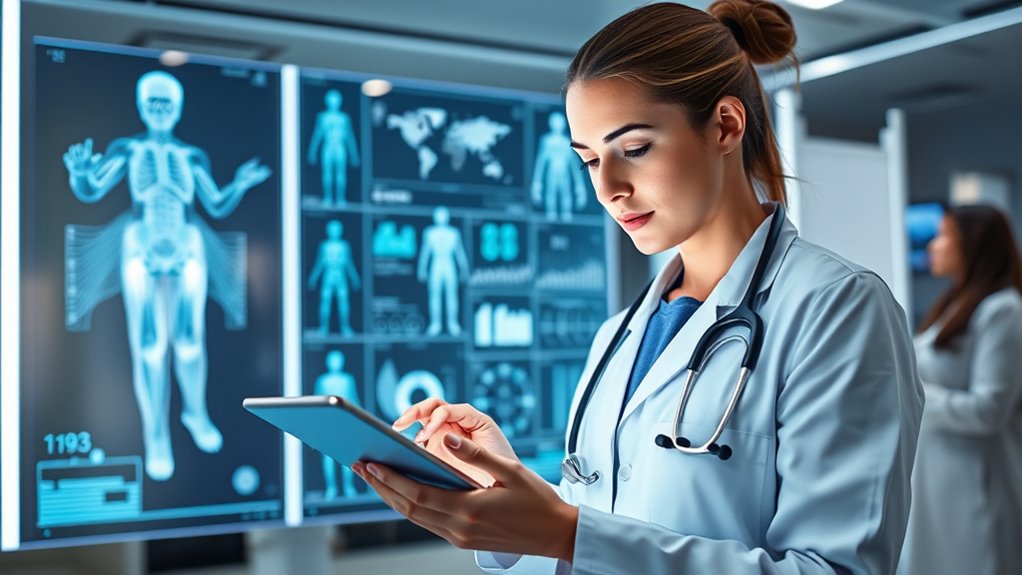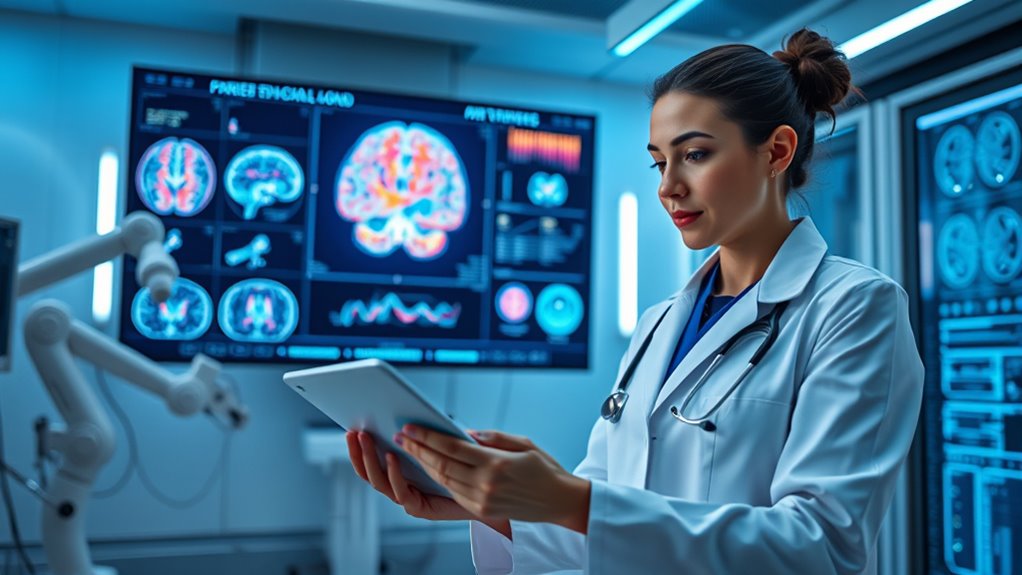AI is transforming healthcare careers by empowering you with advanced tools for diagnostics, surgical assistance, and patient data analysis. It enhances your ability to detect abnormalities early, perform precise surgeries, and develop personalized treatment plans. AI also streamlines workflows and reduces errors, helping you deliver better care. As these technologies evolve, you’ll need to stay updated on new skills and ethical considerations. Keep exploring how AI continues to reshape your field and what it means for your future.
Key Takeaways
- AI enhances diagnostic accuracy through advanced imaging analysis, aiding doctors in early detection of diseases.
- Healthcare professionals need to develop skills in operating and troubleshooting AI-driven medical tools.
- AI supports personalized treatment planning by analyzing large patient data sets and predicting outcomes.
- Medical careers increasingly involve collaboration with AI specialists, data scientists, and technology teams.
- Ethical considerations and continuous learning are vital for integrating AI responsibly into healthcare practices.

Have you ever wondered how artificial intelligence is transforming healthcare careers? It’s an exciting time where technology enhances what you do, making procedures more precise and diagnoses faster. One of the most visible changes is in robotic surgery, where AI-driven systems assist surgeons during complex procedures. These robots don’t replace you but act as highly skilled assistants, offering steadiness, precision, and the ability to perform minimally invasive operations. With AI, robotic surgery becomes more accurate, reducing complications and speeding up patient recovery times. You’ll find that these advancements require you to learn new skills, such as operating and troubleshooting sophisticated robotic systems, but they ultimately empower you to deliver better patient outcomes.
Medical imaging is another area where AI makes a significant difference. You might already rely on X-rays, MRIs, and CT scans, but now, AI algorithms analyze these images with remarkable speed and accuracy. Instead of spending hours scrutinizing scans, you can trust AI to highlight potential abnormalities, flag suspicious areas, and assist in early diagnosis. This not only accelerates the diagnostic process but also reduces human error, giving you greater confidence in your assessments. As AI continues to evolve, you’ll likely find yourself collaborating more with data scientists and radiologists, integrating machine learning tools into your workflow seamlessly. This collaboration enhances your ability to detect subtle signs of disease that might otherwise be missed.
Additionally, advances in tuning methods from automotive technology demonstrate how continuous improvements lead to more refined and effective systems, which is analogous to how AI tools are becoming more sophisticated and tailored for medical applications. The integration of AI into healthcare careers doesn’t stop at surgical assistance and imaging. It also extends to predictive analytics, personalized treatment planning, and real-time decision support. You’ll find that AI tools can analyze vast amounts of patient data, helping you identify patterns and predict outcomes more accurately. This allows for more tailored treatments, improving patient satisfaction and health results. As these technologies become more accessible, your role shifts from solely performing procedures and interpreting images to managing and overseeing AI-powered tools that augment your expertise.
Embracing AI in healthcare careers means continuous learning and adaptation. You’ll need to stay updated on the latest developments, understand how to interpret AI outputs, and ensure ethical considerations are met. But the benefits are clear: enhanced precision, faster diagnoses, and improved patient care. AI doesn’t replace your essential skills; it amplifies them, giving you new capabilities and a competitive edge in the evolving landscape of medicine. So, as you integrate AI into your practice, remember that you’re part of a transformative movement that’s reshaping the future of healthcare—one where technology and human expertise work hand in hand.
Frequently Asked Questions
How Does AI Impact Patient-Doctor Relationships?
AI can improve your patient-doctor relationships by reducing communication barriers and allowing you to focus more on patient empathy. It handles data analysis and routine tasks, freeing up time for meaningful conversations. However, if not used carefully, it might create distance or make patients feel less understood. You need to balance AI tools with genuine empathy, ensuring technology enhances, rather than replaces, personal connection and trust.
What Skills Are Essential for Ai-Focused Healthcare Careers?
You need strong skills in medical coding and health informatics for AI-focused healthcare careers. You should be comfortable analyzing data, understanding algorithms, and managing digital health records. Critical thinking and problem-solving are essential, as is staying updated on AI innovations. Effective communication helps you collaborate with tech teams and healthcare providers. With these skills, you’ll effectively leverage AI to improve patient outcomes and streamline healthcare processes.
Are There Ethical Concerns With AI in Diagnostics?
Yes, there are ethical concerns with AI in diagnostics. You need to contemplate privacy concerns, ensuring patient data stays secure and confidential. Bias mitigation is also critical; if AI systems aren’t properly trained, they can reinforce disparities or produce inaccurate results. You should always evaluate AI tools for fairness and transparency, making sure they support equitable healthcare and respect patient rights. Ethical practices are essential for trustworthy AI implementation in diagnostics.
How Is AI Changing Healthcare Policy and Regulation?
Imagine a compass guiding uncharted waters; AI influences healthcare policy and regulation similarly. It sparks policy innovation but also brings regulatory challenges, as authorities must adapt quickly. You see, AI’s rapid development pushes policymakers to rethink standards, ensuring safety and ethics. This ongoing evolution requires balancing innovation with oversight, helping you navigate the future healthcare landscape where technology and regulation must work hand in hand.
What Are Future Trends in Ai-Driven Medical Research?
You’ll see AI-driven medical research focus more on personalized treatment, tailoring therapies to individual patients’ genetics and health data. Drug discovery will accelerate as AI models predict molecule interactions faster and more accurately, reducing development time. Future trends include integrating AI with real-time health monitoring and genomics, enabling more precise diagnoses and targeted treatments. This shift will revolutionize healthcare, making it more efficient, effective, and personalized for every patient.
Conclusion
As you explore careers at the intersection of AI and healthcare, it’s clear your role will be essential in transforming patient care. With AI handling data analysis and diagnostics, you’ll focus more on compassion and complex decision-making. Do you want to be part of shaping the future of medicine? Embracing AI opens exciting opportunities to make a real difference—are you ready to step into this innovative world and redefine what healthcare can be?









